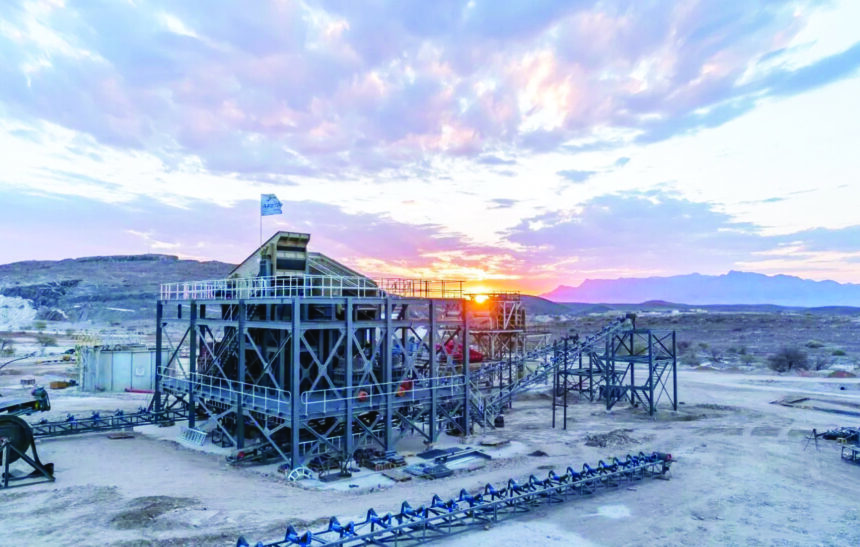Andrada Mining has partnered leading lithium producer, Sociedad Química y Minera (SQM), to develop the Lithium Ridge project in Namibia. SQM, a Chilean chemical company and supplier of plant nutrients, iodine, lithium, and industrial chemicals, is the world’s biggest lithium producer.
The Andrada deal is SQM’s first venture into Africa, and the partnership is expected to unlock the potential of Lithium Ridge as SQM will fund exploration and a feasibility study. In return, SQM agreed to pay Andrada a N$9.2 million participation fee on signing and a further N$27.6 million upon satisfaction of set conditions. Lithium Ridge is located 35 kilometres from Andrada’s Uis Mine and covers approximately 3 300 hectares. The deposit contains significant lithium, tin, and tantalum mineralisation.
However, the agreement is subject to conditions precedent, including getting approval from the Namibian Competition Commission.
Andrada Mining owns the Uis Mine, formerly the world’s largest open-cast hard rock tin mine, and has three mining licences: ML134 (Uis), ML133 (Lithium Ridge), and ML129 (Spodumene Hill). The main minerals for these licences are tin, lithium, and tantalum.
Chief executive officer at Andrada, Anthony Viljoen, expressed excitement about the partnership, stating that the agreement is of strategic importance for both partners.
“This partnership solidifies our belief in the Lithium Ridge asset as a potential world-class resource and further establishes Andrada as a multi-asset, polymetallic explorer and miner. We believe this partnership also significantly enhances the value of our entire asset portfolio,” Viljoen said.
He said the collaboration with SQM will provide the expertise and resources needed to fully unlock the potential of Lithium Ridge, while allowing the continuation of the development of Uis through existing financing relationships.
The statement released by Andrada also indicated that the terms of the deal allow SQM to earn up to a 50% interest in Lithium Ridge through fully funding exploration and the definitive feasibility study (DFS). As part of the agreement, SQM has committed to paying Andrada a total of N$36.8 million in initial payments, with an additional option to invest N$368.4 million over three-and-a-half years.
SQM’s International Lithium Division CEO, Mark Fones, highlighted Namibia’s potential in terms of its abundant mineral resources, adding that they are excited to partner Andrada Mining.
“We are excited to announce the completion of this agreement, which confirms our commitment to finding the best lithium assets in the world that efficiently diversify our portfolio. Namibia is among the top mining jurisdictions in the region, and we are pleased to begin exploration with a proven partner like Andrada Mining,” he said.
A report released last year by stock brokerage, Simonis Storm (SS), indicated that Namibia’s lithium revenues could exceed all other commodities combined, and could therefore improve the domestic trade and current account balances as well as gross domestic product growth rates.
“Given our estimates, the local lithium sector’s revenue to government would be the largest, compared to all other commodity mining operations in Namibia”, the report stated.
In the report, SS cautioned about a long-term view on lithium, given a threat of new entrants to the battery and Electric Vehicle (EV) market. “It can well be that lithium is not the preferred mineral for battery, renewable energy, equipment and electronic consumer goods production in the long run,” Simonis Storm observed.
The report further noted that restarting lithium production in Namibia after 1998 can be a good development for the local mining industry and the country’s economy in general. SS, however, pointed out that given the capital-intensive nature of mining, it was not expected for lithium to contribute to major boosts in socio-economic indicators such as employment, but does view the renewed interest in Namibian lithium mining as a positive for export earnings and government revenue.
“It is important to note that Namibia’s estimated lithium reserves have grade concentrates far below the global standard of 6%. So, Namibia’s lithium exports will fetch a lower global price per tonne and so the estimates above could be overstated, unless better grade concentrates can be discovered,” the SS report continued.
Lithium is a soft, silvery-white alkali metal. Under standard conditions, it is the least-dense metal and the least-dense solid element but is highly reactive and flammable. Lithium is an essential component in modern lithium-ion batteries since it has the highest electrochemical potential of all metals, and the highest specific capacity.
Compared to other battery types, lithium-ion battery technology currently has the highest energy density, the longest cycle life, the widest temperature range tolerance and the lowest self-discharge rates. Because of the auto industry’s shift towards EVs, brought about by proposed bans on fossil-fuel cars beginning at the end of the decade, lithium prices and demand have soared.
-edeklerk@nepc.com.na



